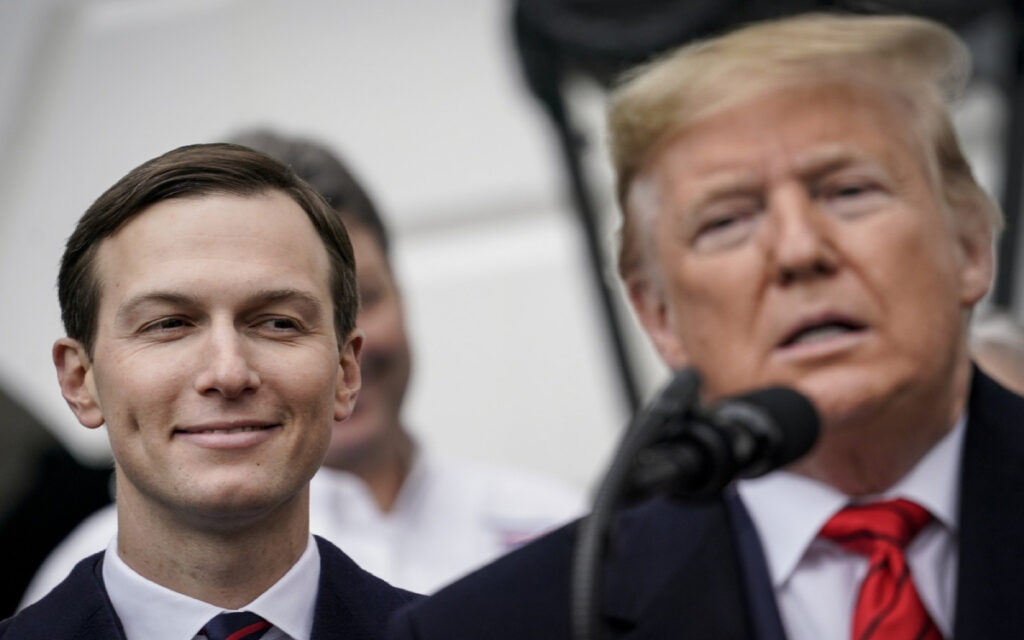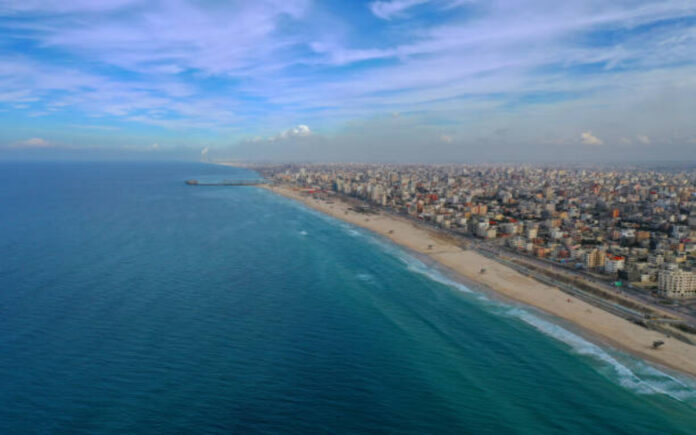Washington: U.S. President Donald Trump’s proposal to transform the Gaza Strip into an international beach resort under American control has sparked widespread criticism, with many calling it an endorsement of forced displacement. The idea, which Trump outlined during a press conference on Tuesday, has drawn condemnation from Palestinians and Western analysts, who argue that it constitutes ethnic cleansing and is a violation of international law.
A Vision Rooted in Real Estate Ambitions
This is not the first time Trump has described Gaza in terms of development potential. In an October 2023 interview, he claimed the enclave could be “better than Monaco” if properly rebuilt. The notion of radical redevelopment gained traction after Israel launched its military campaign against Hamas on October 7, 2023. One of the earliest proponents of this idea was Jared Kushner, Trump’s son-in-law and former Middle East envoy, who played a key role in brokering the Abraham Accords.

“Gaza’s waterfront property could be very valuable if people focused on building up livelihoods,” Kushner said during a Harvard event in February 2024. He previously described the Israeli-Palestinian conflict as “nothing more than a real-estate dispute.” Kushner, a former New York property developer, also suggested that Israel should seek to relocate Gaza’s population before undertaking reconstruction.
A spokesperson for Kushner did not immediately respond to requests for comment.
Doubts Over Feasibility
Despite Trump’s bold rhetoric, many question how seriously his proposal should be taken. A source close to the Saudi royal court dismissed the idea, stating, “It has not been thought through and is impossible to implement, so he will eventually realize that.” Saudi Arabia’s foreign ministry issued a statement on Wednesday rejecting any attempt to forcibly displace Palestinians.
The Palestinian Authority and Hamas also denounced Trump’s remarks, viewing them as part of a broader agenda to erase Palestinian claims to Gaza.
Reuters was unable to determine whether Kushner, whose private equity firm has received $2 billion in investments from Saudi Arabia, has pursued any regional discussions regarding Gaza’s redevelopment.
Historical Parallels and Social Media Mockery
For Palestinians, the concept of Gaza as a high-end resort echoes the “Nakba”—the mass displacement of 700,000 Palestinians during the 1948 Arab-Israeli War. In recent months, social media has been flooded with memes depicting a future Gaza filled with luxury beachside condominiums, often shared by pro-Israel users.
Israeli officials have long accused Palestinian leaders of prioritizing armed resistance over economic development. In previous years, Gaza’s coastline was a popular destination for Israeli tourists. Even after Hamas took control in 2007, the enclave maintained a small but vibrant beachfront café scene.
However, transforming Gaza into the “Riviera of the Middle East” faces immense challenges. Land ownership in the enclave is governed by a complex mix of Ottoman, British Mandate, Jordanian, and clan-based legal traditions. Foreign ownership is heavily restricted, and Gaza has been subjected to over a decade of blockade, limiting access to essential materials and financial resources.
Reconstruction Costs and Gulf Reluctance
Following 15 months of war, Gaza has been left in ruins. Trump’s own special Middle East envoy, real estate magnate Steve Witkoff, recently described the enclave as a “demolition site” requiring at least 10-15 years of reconstruction. Estimates for rebuilding range as high as $100 billion.
Gulf nations, seen as key potential investors, have largely dismissed financing reconstruction efforts without a clear path to Palestinian statehood. Major Israeli construction firms and business groups have also remained silent on the proposal, citing the unpredictable political landscape.
Also Read | Sheikh Mujibur Rahman’s Historic House Burned by Protesters in Bangladesh
“Large-scale redevelopment in post-conflict areas generally requires significant investment, stability, and long-term planning, but beyond that, it’s impossible to assess anything concrete right now,” said Raz Domb, an analyst at Leader Capital Markets in Tel Aviv.
Settler Movement Embraces the Proposal
While Trump’s idea has faced widespread skepticism, one group that has welcomed it is Israel’s settler movement. For decades, settlers have sought a return to Gaza, which was evacuated in 2005 under Prime Minister Ariel Sharon’s disengagement plan.
Although Trump stated he does not envision Jewish settlements in Gaza, his comments were swiftly embraced by settler organizations. The Nachala Movement, which advocates for West Bank settlements, held a conference last year titled “Preparing to Resettle Gaza,” where Likud politicians discussed the “emigration” of Palestinians and the rebuilding of Jewish communities.
Also Read | No Privacy Risk from Musk’s Email Server, Claims OPM in Court Filing
“Assuming Trump’s comments about transferring Gazans to other countries are translated into practice, we must hurry and establish settlements throughout the Gaza Strip,” the group posted on social media. “No part of the land of Israel should be left without Jewish settlement.”
Conclusion
Trump’s vision for Gaza as a luxury resort faces immense geopolitical, legal, and financial hurdles. While some in Israel’s settler movement see an opportunity, the broader international community, including key Gulf nations, remains deeply skeptical. Whether this proposal is a serious policy initiative or another example of Trump’s signature negotiation style remains unclear. However, for Palestinians, it serves as yet another reminder of historic displacement and the ongoing struggle for sovereignty.



